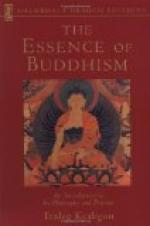May I never do, nor cause to be done, nor contemplate the doing of, even the most trivial sin!—Attanagalu-vansa (conclusion).
Let not one who is asked for his pardon withhold it.—Mahavagga.
’T is wrong to conquer him who sues for mercy.—Lalita Vistara.
Let none out of anger or resentment wish harm to another.—Metta-sutta.
Let us then live happily, not hating those who hate us. In the midst of those who hate us, let us dwell free from hatred.—Dhammapada.
For hatred does not cease by hatred at any time; hatred ceases by love; this is an old rule.—Dhammapada.
(To the) self-reliant there is strength and joy.—Fo-sho-hing-tsan-king.
Let him not grieve for that which is lost.—Attadanda-sutta.
Not from weeping or grieving will any obtain peace of mind.—Salla-sutta.
At first my sorrowing heart was heavy; but now my sorrow has brought forth only profit.—Fo-sho-hing-tsan-king.
Give to him that asketh, even though it be but a little.—Udanavarga.
He delights in giving so far as he is able.—Questions of King Milinda.
Your guileless heart loves to exercise its charity.—Fo-sho-hing-tsan-king.
Always intent on bringing about the good and the happiness of others.—Jatakamala.
Earnestly practice every good work.—Fo-sho-hing-tsan-king.
If they may cause by it the happiness of others, even pain is highly esteemed by the righteous, as if it were gain.—Jatakamala.
When pure rules of conduct are observed, then there is true religion.—Fo-sho-hing-tsan-king.
Wherein does religion consist?
In (committing) the least possible harm, in (doing) abundance of good, in (the practice of) pity, love, truth, and likewise purity of life.—Pillar Inscriptions of Asoka.
(Not superstitious rites, but) kindness to slaves and servants, reverence towards venerable persons, self-control with respect to living creatures, ... these and similar (virtuous actions are the rites which ought indeed to be performed.)—Rock Inscriptions of Asoka.
The practice of religion involves as a first principle a loving, compassionate heart for all creatures.—Fo-pen-hing-tsih-king.
Shall we in worshipping slay that which hath life? This is like those who practice wisdom, and the way of religious abstraction, but neglect the rules of moral conduct.—Fo-sho-hing-tsan-king.
How can a system requiring the infliction of misery on other beings be called a religious system?... To seek a good by doing an evil is surely no safe plan.—Fo-pen-hing-tsih-king.
Unto the dumb lips of his
flock he lent
Sad pleading words, showing
how man, who prays
For mercy to the gods, is
merciless.
—Sir Edwin Arnold.
I then will ask you, if a man, in worshipping ... sacrifices a sheep, and so does well, wherefore not his child, ... and so do better? Surely ... there is no merit in killing a sheep!—Fo-pen-hing-tsih-king.




